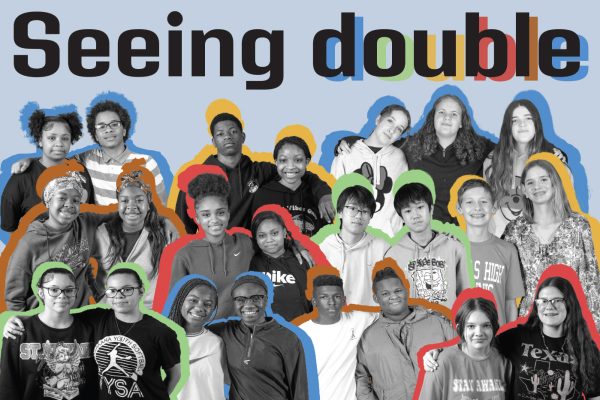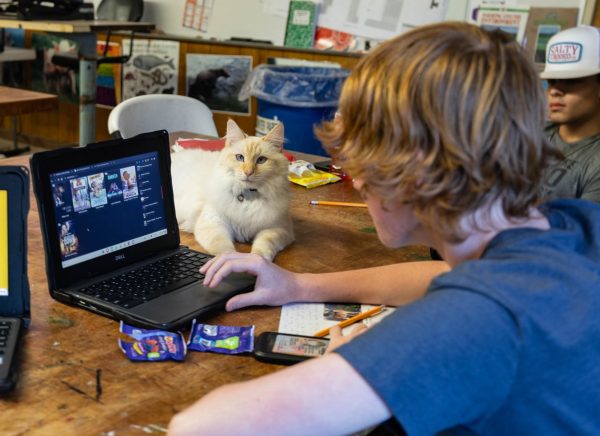The working experience
Students explain maintaining a school-work balance
Junior Lilliana Sanchez must balance her work on the TigerVision crew with her actual school work. Often times it can be difficult to learn where the fine line between the two lies.
March 29, 2023
As a teenager, it can be difficult to keep up with grades, extracurricular activities and home responsibilities. However, many students have a time-consuming job on top of all of their day-to-day responsibilities. Maintaining a productive work-school balance forces you to decide what your priorities are and create schedules to manage time. Yet, students who work part-time have better grades and graduate with less debt than full-time students, according to McPherson College.
In college there are many opportunities for students to work through their school, whether they are a barista at the on-campus coffee shop or an administrative assistant. However, in highschool it’s more difficult for students to work through school, but with programs like Tiger Vision and Red River Student Credit Union, we’re given the opportunity to do freelance gigs and be bank tellers.
“Anyone in the advanced Tiger Vision class can join the crew, and there are some that Mr. Aldridge handpicks specific people if it’s an important event when he needs more experienced people,” junior Lilliana Sanchez said. “I do a lot of tech-directing so I have what’s called a switcher, where I press different buttons and decide what’s shown on either the score board or a livestream by picking which camera is displayed.”
There are ups and downs to every job, and while living in a country that prioritizes work above all else, you have to decide whether the cons of having to close up a store every night or working too many hours that take up your studying time is worth the money.
“My least favorite part is when we have an event at the convention center and we have to set up for a whole day. Then after we’ve finished, we have to break everything down and roll up all of the cords,” Sanchez said. “But I’m friends with everyone who works, and they make it really fun because we’re always laughing together.” I prefer working with my dad because if there are things that I don’t know, I won’t hesitate to ask him because of our close relationship. Knowing that he will teach me extensively and properly. There’re — Colten Crysel
Many students gravitate towards the service industry because the jobs are accessible and require little to no experience. The food industry particularly provides various job opportunities: hosting, waiting on tables, cooking, to-go and bussing tables. This allows students to develop financial skills and patterns they can use later in life, support themselves and their family, if necessary, and enhance their social skills, when developing relationships with co-workers and new customers everyday.
“As a host you can do a lot of different jobs. You can do the basic hosting job where you take silverware and bread to the table you’re seating them at. There’s also names where you print out the tickets and choose where customers sit on a tablet. Lastly, there’s the updater that updates when tables are dirty, and need to be cleaned,” junior Juliette Gonzales said.
It seems as though we treat the people higher up in a business or corporation with great admiration and respect. Yet, we treat the underpaid retail workers with little to no respect even though the people in the leading roles of many popular companies are riding on a wave of their labor and support to fill their own pockets. The least we can do is use basic human respect and compassion towards those who are trying their best to support themselves.
“My least favorite part is when customers have an attitude and they’re not very understanding of the circumstances we’re under when they’re multiple groupings of customers waiting to be seated, and they aren’t considerate of anyone other than themselves,” Gonzales said.
Physical labor shows people how to appreciate money that they worked tirelessly for. As well as giving them the chance to develop skills that most people don’t know how to do themselves like plowing, installing water lines and properly transporting machinery.
“I work for my dad under a company called Farmscapes. We clear land and get it prepared to be built on, as well as hauling different materials and machinery,” senior Colten Crysel said. “We deal with a lot of heavy lifting and jobs people pay others to do because they don’t want to do them.” With entrepreneurship you find new ways to make more money and new ways to get out there. — Ka’Leah Williams
Living with your boss is a unique experience, but many young students gravitate towards working for their loved ones due to the benefits in pay, hours, familiarity and trust.
“I prefer working with my dad because if there are things that I don’t know, I won’t hesitate to ask him because of our close relationship. Knowing that he will teach me extensively and properly. There’re benefits regarding pay that random employers wouldn’t agree on. I’m also more trusted with equipment because a random employer wouldn’t have the same level of trust that my dad and I carry,” Crysel said.
When creating a small business, it’s important to profit off of a skill or passion you’re already pursuing. Customers appreciate when workers enjoy their job and want to excel in it; people put their money towards enthusiasm and skill.
“I customize t-shirts based on an event someone has. You make those with vinyl, you prep them, then you create the design. [With my hair business,] I do the bookings and set up dates, along with managing clients, then doing whatever design they want,” senior Ka’Leah Williams said. “With entrepreneurship you find new ways to make more money and new ways to get out there. So it’s really hard with the marketing.”
Temporary goals don’t need to directly lead to your final career goals. Experience and building up money with activities that you’ve excelled in can still positively impact your future.
“I would still call myself a beginner because I have to stop and start due to the fact that I’m involved in so many different things. Grades always come first. This isn’t what I want to do in the future, so I can put it on the back burner,” Williams said.





















